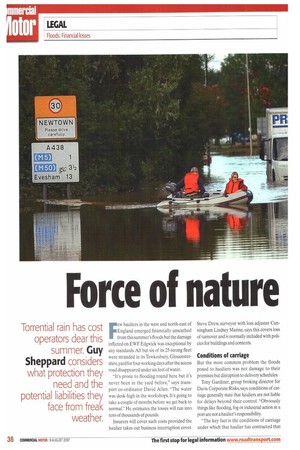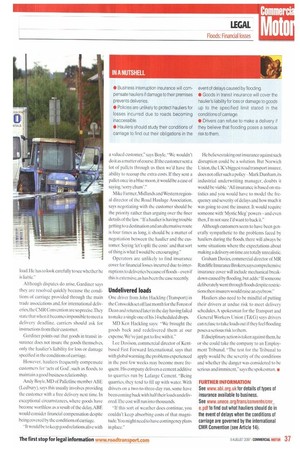Force of nature
Page 36

Page 37

If you've noticed an error in this article please click here to report it so we can fix it.
Torrential rain has cost operators dear this
summer. Guy Sheppard considers
what protection they need and the potential liabilities they face from freak weather.
Few hauliers in the west and north-east of England emerged financially unscathed from this summer's floods but the damage inflicted on EWF Edgwick was exceptional by any standards. All but six of its 25-strong fleet were stranded in its Tewkesbury, Gloucestershire,yard for four working days after the access road disappeared under six feet of water.
"It's prone to flooding round here but it's never been in the yard before," says transport co-ordinator David Allen. "The water was desk-high in the workshops. It's going to take a couple of months before we get back to normal." He estimates the losses will run into tens of thousands of pounds.
Insurers will cover such costs provided the haulier takes out business interruption cover. Steve Drew, surveyor with loss adjuster Cunningham Lindsey Marine, says this covers loss of turnover and is normally included with policies for buildings and contents.
Conditions of carriage
But the most common problem the floods posed to hauliers was not damage to their premises but disruption to delivery schedules.
Tony Gardiner, group broking director for Davis Corporate Risks, says conditions of carriage generally state that hauliers are not liable for delays beyond their control. "Obviously things like flooding, fog or industrial action at a port are not a haulier's responsibility "The key fact is the conditions of carriage under which that haulier has contracted that load. He has to look carefully to see whether he is liable."
Although disputes do arise, Gardiner says they are resolved quickly because the conditions of carriage provided through the main trade associations and, for international deliveries, the CMR Convention are so precise.They state that when it becomes impossible to meet a delivery deadline, carriers should ask for instructions from their customer.
Gardiner points out that goods in transit insurance does not insure the goods themselves, only the haulier's liability for loss or damage specified in the conditions of carriage.
However, hauliers frequently compensate customers for 'acts of God', such as floods, to maintain a good business relationship.
Andy Boyle, MD of Palletline member ABE (Ledbury), says this usually involves providing the customer with a free delivery next time. In exceptional circumstances, where goods have become worthless as a result of the delay, ABE would consider financial compensation despite being covered by the conditions of carriage.
"It would be to keep good relations alive with a valued customer," says Boyle. "We wouldn't do it as a matter of course. If the customer sent a lot of pallets through us then we'd have the ability to recoup the extra costs. If they sent a pallet once in a blue moon, it would he a case of saying, 'sorry chum'."
Mike Farmer, Midlands and Western regional director of the Road Haulage Association, says negotiating with the customer should be the priority rather than arguing over the finer details of the law. "If a haulier is having trouble getting to a destination and an alternative route is four times as long, it should he a matter of negotiation between the haulier and the customer. Saying let's split the costs' and that sort of thing is what I would be encouraging."
Operators are unlikely to find insurance cover for financial losses incurred due to interruptions to deliveries because of floods—even if this is extensive, as has been the case recently.
Undelivered loads
One driver from John Hackling (Transport) in the Cotswolds set off last month for the Forest of Dean and returned later in the day having failed to make a single one of his 14 scheduled drops.
MD Ken Hackling says: "We brought the goods back and redelivered them at our expense. We've just got to live with it."
Lee Davison, commercial director of Kentbased Fast Forward International, says that with global warming, the problems experienced in the past few weeks may become more frequent. His company delivers a cement additive to quarries run by Lafarge Cement. "Being quarries, they tend to fill up with water. With drivers on a two-to-three-day run, some have been coming back with half their loads undeliverecl.The cost will run into thousands.
"If this sort of weather does continue, you couldn't keep absorbing costs of that magnitude.You might need to have contingency plans in place." He believes taking out insurance against such disruption could be a solution. But Norwich Union, the UK's biggest road transport insurer. does not offer such a policy —Mark Dunham, i ts industrial underwriting manager, doubts it would be viable. "All insurance is based on statistics and you would have to model the frequency and severity of delays and how much it was going to cost the insurer. It would require someone with 'Mystic Meg' powers — and even then, I'm not sure I'd want to back it."
Although customers seem to have been generally sympathetic to the problems faced by hauliers during the floods, there will always be some situations where the expectations about making a delivery on time are totally unrealistic.
Graham Davies, commercial director of MR Ratcliffe Insurance Brokers,says comprehensive insurance cover will include mechanical breakdown caused by flooding. but adds: "If someone deliberately went through floods despite restrictions then insurers would raise an eyebrow: Hauliers also need to be mindful of putting their drivers at undue risk to meet delivery schedules. A spokesman for the Transport and General Workers Union (T&G) says drivers can refuse to take loads out if they feel flooding poses a serious risk to them.
If disciplinary action is taken against them, he or she could take the company to an Employment Tribunal. "The test for the Tribunal to apply would be the severity of the conditions and whether the danger was considered to be serious and imminent," says the spokesman. • FURTHER INFORMATION
See wwl.v.abi.org.uk for details of types of insurance available to business.
See www.unece.org/trans/conventn/cmr_ e.pdf to find out what hauliers should do in the event of delays when the conditions of carriage are governed by the international CMR Convention (see Article 14).






















































































































































































